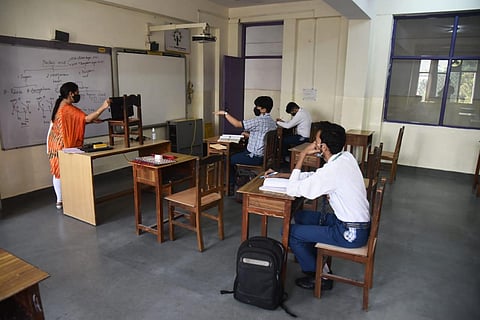

The National Education Policy is focused on future education management and will broaden the horizon of our students by change the way learning is imparted, said Dr Ramesh Unnikrishnan, Former Director of Approval Bureau, AICTE, and Dr Munirudheen A, Director, AI International College, Kerala.
Rajeev Gowda, former MP and professor, Indian Institute of Management-Bangalore, was of the view that Covid-19 will change the way students engage with learning.
The experts were in conversation with Daniel Thimmayya, Chief Reporter, Edex, in TNIE Expressions, a series of live webcasts with prominent people.
NEP is the Indian version of global education — what education should look like when there is no narrowing down, said Dr Unnikrishnan.
“The present system had pre-defined ladders or brackets — an engineer should mandatorily study just the curriculum and their other interests are not taken into account. NEP-2020 is aimed at the overall development of the students with a huge emphasis on society, history, what the student actually wants to be. The major challenge now is for teachers, while students have more choices… teachers need to figure out what to teach and how to teach,” he said.
Dr Unnikrishnan added that every teacher has two counterparts now — YouTube and Google.
“The biggest competition lies there. Thus, we have kept 12-13 years as the home-working period, in order to measure and observe the impact of the NEP,” he said.
Agreeing with him, Dr Munirudheen A, said: “NEP is driving us to focus on the future instead of counting on the heritage or history of the institute. It is going to create a positive impact on how institutes will educate their students and how they will be welcomed at the workplace. Students were not given much freedom to expose themselves to discovery kind of learning, but now with autonomous institutions, they will have much more flexibility.”
On whether Covid-19 has brought along opportunities that colleges can take away from, Prof Rajeev Gowda, said, “Students have to be proactive, life-long learners, keep adapting to how they learn today and then open up courses themselves over the years. Campus placements, internships pose a challenge now as these experiences are disrupted.”
“Covid-19 has slowed down the economy, the number of jobs created will be lower. It’s up to our students now to remember the phrase ‘when the going gets tough, the tough gets going’. They need to think about what opportunities this disruption is providing, invest now in skills that enable them to perform better online, they will be in a better position.”
Both Gowda and Munirudheen agreed that Covid-19 had indirectly helped digital education push and opened the horizons for both students as well as teachers.
“Internet-enabled education has opened people’s eyes and minds to continuous upskilling, investment in oneself and exploring different domains,” said Gowda.